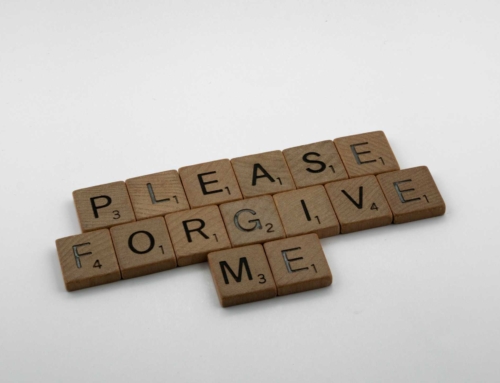 Let’s be real with each other for a minute – we’re all a little messy. Even the best of us is not consistently loving, understanding, empathetic, or completely mature. We look out for our interests, often at the expense of others, and the people who are closest to us often experience both the best and the worst of who we are.
Let’s be real with each other for a minute – we’re all a little messy. Even the best of us is not consistently loving, understanding, empathetic, or completely mature. We look out for our interests, often at the expense of others, and the people who are closest to us often experience both the best and the worst of who we are.
Scripture affirms this view of things, labeling that messiness as sin. Sin is about missing the mark, not meeting a particular standard, or deviating from the good that we ought to pursue wholeheartedly. People are beings created by God in His image (Genesis 1:26-28).
That same narrative later tells us that sin entering the world means that human beings aren’t what they are supposed to be. This doesn’t mean that we are necessarily monsters, but it does mean that we’re messy. Part of the mess we make of ourselves is in how we relate to other people. We receive and cause relational hurt, derailing the flourishing God intends for us and everyone around us.
What healthy relationships look like.
Even in the healthiest of relationships, there may be seasons of messiness and toxic behaviors. We’re not always patient, open-minded, generous, and selfless, and we can distort or obscure the truth when it suits us and our agendas.
This goes for parent-child relationships, or for how siblings, lovers, friends, neighbors, and colleagues relate to one another. However, in healthy relationships, these behaviors don’t form a consistent or persistent pattern; other positive behaviors dominate how the people in the relationship relate to one another.
There are a few key features that all healthy relationships possess, and these include the following:
Mutual accountability and trust.
People in healthy relationships are held to a standard, and they allow themselves to be held accountable for falling short of that standard. It takes time to build trust, but healthy relationships have cultivated trust, meaning they don’t have to keep tabs or seek control over one another.
Forgiveness.
None of us is perfect, and when we fall short, while the people in our lives hold us accountable, healthy relationships carry the dimension of forgiveness. Forgiveness is the way to avoid nurturing resentment and maintain life-giving interactions. The generosity of spirit required to forgive (especially the regular acts of forgiveness necessitated by living in close quarters with others) is a gift.
Maintain healthy boundaries.
Even in romantic relationships, cultivating intimacy and the health of the relationship requires recognition that you are an individual with unique needs and capacities. Boundaries are the key to a healthy relationship, as they allow you to create room to meet one another’s needs in the way that’ll be most appreciated.
 Open and honest communication.
Open and honest communication.
Good communication is the lifeblood of healthy relationships, as that is how you articulate your needs, resolve conflict, and cultivate emotional intimacy. Healthy relationships have good communication in spades, which allows the people in the relationship to express and deal with their differences in a healthy way.
Affirmation and mutual support.
In a healthy relationship, you feel seen and heard. Not only that, but you receive wise affirmation and support as you pursue your goals and dreams. The world is tough to navigate, and many obstacles stand in the way of our personal and professional flourishing. Healthy relationships provide an atmosphere of support and nurture in which one’s person and gifts are recognized and celebrated.
It’s a two-way street.
Each person in a relationship has something to offer, and healthy relationships create space for mutual edification. Now, relationships are rarely ever 50-50, because our needs, responsibilities, and gifts rarely divide into neat halves. However, in healthy relationships there is an appropriate sense of give and take that permeates the interactions.
These are just some examples of how healthy relationships function. We turn now too toxic traits in relationships.
Toxic traits in a relationship.
While we all might like to be well-balanced, supportive, open-minded, and generous people all the time, that’s not always the reality. Toxic traits in a relationship are those unhealthy traits that show up consistently during a relationship. They shape how the people in a relationship relate to one another, and ultimately they undermine the well-being of the people in that relationship.
Some of the toxic traits in a relationship that are clear red flags include the following:
Constant criticism.
Someone once said that to err is human, and that’s true enough. However, it matters how we deal with each other’s faults. The apostle Paul in his letter to the Christians in Galatia wrote, “Carry each other’s burdens, and in this way, you will fulfill the law of Christ” (Galatians 6:2, NIV). The opposite of that is to constantly criticize.
It’s one thing to point out where someone may be going wrong, but criticism is picking at the other person’s behavior, and typically without empathy or an offer of support to help them get through. Criticism can be about the person’s looks, weight, choice of employment, and so on.
One man/woman show.
 Instead of being a situation of mutual edification, it’s toxic to have the focus be on one person in the relationship. Toxic relationships are often defined by unrestrained power and control over others, and these traits can surface in any kind of relationship.
Instead of being a situation of mutual edification, it’s toxic to have the focus be on one person in the relationship. Toxic relationships are often defined by unrestrained power and control over others, and these traits can surface in any kind of relationship.
The relationship cannot be about meeting the needs of just one person or having one person dictate the agenda. A healthy relationship requires boundaries, but unhealthy relationships often have poor or non-existent boundaries.
Jealousy.
There is such a thing as healthy protectiveness over loved ones. In a marriage relationship, for instance, one spouse would be right to feel some type of way about their spouse showering affection on someone else. The marriage covenant is meant to make certain things exclusive to the couple, so feeling protective over intimacies being spread abroad is understandable.
Jealousy, however, is when this instinct goes into overdrive, and becomes another form of control. If you have no legitimate reason to not trust your spouse’s interactions with others, jealousy is an unhealthy expression of insecurity and the desire to control others. Jealousy can also manifest between friends and is often the hallmark of codependency.
Resentment.
People do all sorts of things that annoy others. If we hold onto every annoying thing someone does to us, it will settle in our hearts like sediment that calcifies over time until we resent that person. Resentment poisons relationships and it gives the devil a foothold (Ephesians 4: 26-27) to undermine that relationship and others around it.
Resentment is not good for you or your health, and it distorts how you relate to each other in your relationship. Resentment also often builds up in relationships because of another, related toxic trait, and that is the avoidance of conflict. Healthy relationships embrace conflict and work to resolve it, while unhealthy relationships shy away from it, or have protracted conflict without resolution.
Unhealthy anger.
We’ve all felt angry, and if we’re in a relationship with another person, there’s a good chance they’ll say or do something that drives us up the way. What do you do with that anger, though? A toxic trait in relationships is dealing with anger in inappropriate ways, and that includes clamming up and saying nothing, directing that anger inward, or expressing it violently.
The violence that vents anger can happen verbally or physically, and they are both extremely damaging. Expressing anger passive-aggressively also undermines a relationship, whether that’s giving someone the silent treatment or being snarky.
Gaslighting and manipulation.
Control and abuse of power also manifest as gaslighting, which is a way of putting the other person on their back foot by making them doubt their memory and perception of reality. Gaslighting is one way that people avoid accountability, but it’s doing so by way of destroying the other person’s ability to hold their counterpart accountable.
These traits and many others not enumerated here are toxic and destructive for relationships. if these traits are present in your relationship, they ought to be addressed posthaste so they do not define the relationship.
How to fix toxic traits in a relationship.
 One key to fixing toxic traits in a relationship is to see them as just that – toxic. If you become inured to a set way of doing things, you may feel like that’s just the way things are supposed to be. This is especially the case in long-term relationships like the parent-child dynamic – you just don’t know any difference.
One key to fixing toxic traits in a relationship is to see them as just that – toxic. If you become inured to a set way of doing things, you may feel like that’s just the way things are supposed to be. This is especially the case in long-term relationships like the parent-child dynamic – you just don’t know any difference.
In relationships laced with gaslighting, you may not trust what your instincts are saying. However, exposure to others may clue you that something is off. If people around you notice and say that a certain relationship is unhealthy, pay attention and take it seriously.
Beyond knowing that there’s an issue, it’s important to take steps to affirm your boundaries and introduce accountability to the relationship. If the other person is used to speaking to you a certain way, draw a boundary and tell them that if they speak that way to you, you’ll walk out of the room and stop engaging. When the time comes, enforce the boundary.
Accountability may mean being willing to walk away from the relationship if nothing changes. If you see these toxic traits in a prospective relationship, see them for the red flags that they are and walk away before you get emotionally or otherwise invested in the situation.
It goes without saying that if you’re used to doing life one way, starting to do things a different way can be challenging. You may not know how to change, or what needs to change and why.
Additionally, there are deep-seated roots to our behaviors that inform how we think and react in each situation. Changing how we’ve always done things will mean exploring new territory and cultivating new skills such as problem-solving and conflict resolution.
In all this, you can seek out counseling to get the help you need. Your counselor is a skilled individual who’s received training in understanding complex relationship dynamics. They can guide conversations toward meaningful outcomes and help you grow as an individual.
If you’re at an impasse in a particular relationship, and you feel like you’re out of your depth about what to do to turn things around, why not reach out to a Christian counselor today? They will help you by unpacking your concerns in a safe, non-judgmental environment, answering your questions while cultivating the skills you need to help you manage your relationships well.
“White Flowers”, Courtesy of Sies Kranen, Unsplash.com, CC0 License; “White Flowers”, Courtesy of Sigmund, Unsplash.com, CC0 License; “Night Sky”, Courtesy of Andreas Weilguny, Unsplash.com, CC0 License; “Campfire”, Courtesy of Benjamin DeYoung, Unsplash.com, CC0 License









